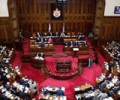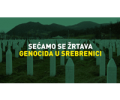The Supreme Court of the Republic of Serbia illegally overturned the first instance ruling in the Ovčara case
The decision of the Supreme Court to overturn the first instance ruling in the Ovčara case has no legal or factual grounds. The Supreme Court carries on its practice of overthrowing every judgment made in war crimes trials and returning it for retrial. Three first instance judgements have been considered and decided on by the Supreme Court and all three were overturned and sent back for retrial.
None of the Supreme Court’s decisions were based on legal facts, and what is common for all three of them is that they incorrectly interpret the legal aspect of each case file they reviewed. Particularly in the Ovčara case, the Court’s position is, to put it mildly, contrary to the legal solutions and judicial practices. For example, the request to obtain psychiatric evaluation of a witness, to harmonize opinions of individual experts with those of the Expert Commission, and in cases where that is not possible, to order additional super-expertise, to double check investigations’ minutes which indicate that a defense attorney was present at interrogation, to allow the accused who was indicted based on legally founded facts to testify as a witness regardless of the fact that a legally binding judgement was presented as evidence.
The reasoning behind the decision of the Supreme Court to overturn the first instance ruling is as follows:
i. that the first instance court overstepped the indictment by leaving out the part of the indictment stating that Milan Lančužanin killed the prisoners of war by firing from his weapons. This does not constitute overstepping of the indictment, but an act in favour of the accused by omitting an incriminating part of the indictment. It was established by the Court that the accused Lančužanin ordered the murder of prisoners of war, but did not have evidence that he personally participated in the execution which is the reason they left that part out.
ii. to question defense attorney Milan Veljković in order to establish whether he was present when Jovica Perić gave his statement to The Anti-Organized Crime Directorate (UBPOK) inspector, since had he not been present, the statement should have been separated. However, it was noted in the minutes that Milan Veljković, the defense attorney of the accused Perić was present at interrogation. Interrogation minutes is an official document and it is presumed to be true until it is proven to be a counterfeit in the course of criminal proceedings.
iii. that it was not established that Milan Vojnović took part in the execution in Grabovo and the reason being that his name is not mentioned by plaintiffs Franjo Kožul, Jadranka Janjić, Mile Maćešić, and Sandra Grejza. These plaintiffs cannot testify about the execution in Grabovo or about perpetrators because they were not there at all, and they cannot testify on the circumstances of the execution.
iv. that the hearing of witness Mišel Husnik should have offered information about the time the accused Ivan Atanasijević left for Velepromet and Ovčara in order to determine whether the accused only killed one of the prisoners of war in Grabovo or whether he took part in the execution of all prisoners. It is irrelevant whether the accused killed one or more prisoners for legal qualification of the criminal act of war crime.
v. with respect to Predrag Madžarac, the Supreme Court overturned the verdict because witness Nikola Dukić stated that he had seen the accused Madžarac in the execution squad in Grabovo, but that he was not sure whether he fired or not because he was not able to see the flames coming out of his rifle barrel. For legal qualification of the criminal act of war crime the fact that he was a member of the execution squad is sufficient, and on the other hand, it is very difficult to expect that the witness was really able to see the flames from the rifle barrel of each member of the squad.
vi. that it was not determined beyond a reasonable doubt that the commander of the Vukovar Territorial Defense (TO) and his deputy were Miodrag Vujović and Stanko Vujanović. Countless witnesses have confirmed so far that the two of them were holding these positions. It is only unclear who brought them to those positions, which does not in the least affect their responsibility.
vii. to obtain psychiatric evaluation of the witness-collaborator No. 1. The question is whether this evaluation is indeed necessary because its purpose is for the psychiatrists to determine whether the witness is telling the truth or not. That is absurd because it is only the Court that can establish whether someone is telling the truth or not. Apart from this, psychiatric evaluation of a witness is unprecedented.
viii. the Supreme Court decided to overturn the first instance ruling because expertises of court experts Jančić and Aleksandrić in terms of the ability of the accused Vujo Zlatar to move are not in agreement and because additional super-expertise was not ordered. First of all, court expert Jančić performed his job individually, and court expert Aleksandrić was representative of a commission made up of three experts, all three of whom are Medical School professors. The Criminal Procedure Code clearly states that if there is collision between opinion of an individual expert and the Expert Commission there is no need for agreement or for additional super-expertise, because the Commission’s finding prevails.
ix. the Supreme Court does not accept interpretation of the first instance court that Predrag Draganović took part in the execution in Grabovo, declaring it insufficient because the first instance court drew that conclusion from the statement of witness-collaborator No. 1, who quoted Draganović saying in front of the hangar, upon his return from Grabovo: “Those Ustasha pussies are done away with”. It is quite unusual for someone who did not take part in the execution to boast in this manner, which makes the conclusion of the first instance court correct and logical.
x. the Decision is overturned, among other things, also because there is insufficient evidence that the accused Predrag Milojević and Đorđe Šošlić killed one prisoner each by slitting their throats. The first instance court in its ruling explained that the court medical documentation, especially the findings of professor Tasić, court expert, indicate that the cause of death in one case is a stab wound to the head, neck, and torso, in two cases the cause of death are combined injuries stab-slit wounds and gunshot wounds, and in four other cases the cause of death was not classified. In conclusion, there are seven cases where death might have been caused by stab-slash wounds. Both Milojević and Šošlić are accused of killing one prisoner each by slitting their throats. In a situation when this is confirmed by an eyewitness (witness-collaborator No. 1), the enclosed finding of court medical expert Professor Tasić directly confirms the statement of witness-collaborator No. 1 and does not compromise it in any way.
xi. the motion by Sava Štrbac, the defense council of the accused Ivica Vuletić, indicted of war crimes before the Cantonal Court in Osijek, to hear Vuletić as a witness was granted. The court presented the evidence by reviewing the Decision of the Cantonal Court in Osijek and made certain conclusions, explaining them in detail in the Decision. Hearing the accused person as a witness in the Ovčara case would not establish anything other than what the first instance court established by reviewing the Decision of the Cantonal Court in Osijek.







